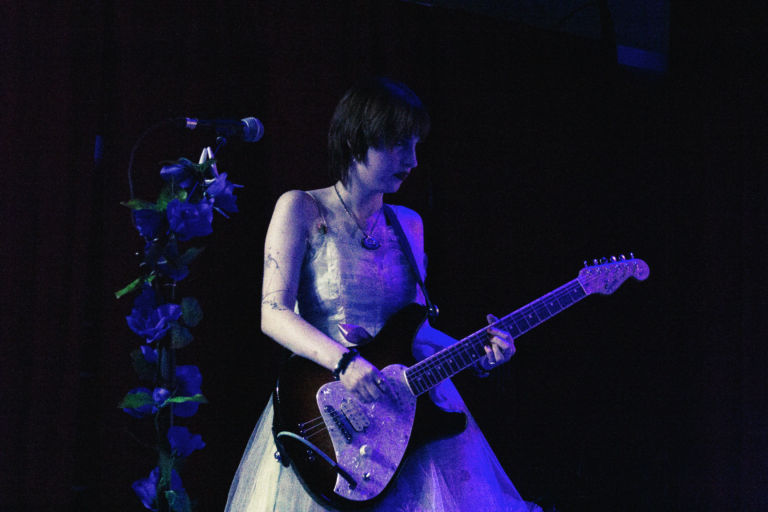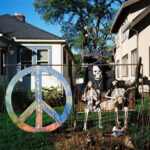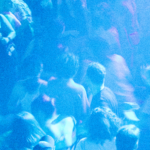By Max Cohen
Photos by Carolina Carmo
Flowers for the Dead are a three piece of DMV-bred 20 somethings who are probably sick of being compared to 90s alt rock bands. Since the release of their 2022 debut album Quiet Corrosion in the Dancing Hall they’ve built a solid base seeping from D.C.’s legendary underground scene and made serious connections along the way. Their audiences don’t have to be asked to crowd the stage, they just lean in. Venue owners, bookers, promoters, photographers and all the other local musicians can feel the buzz. Stranger, less listenable acts than Flowers have made it big and if they open for another indie critic darling or get name dropped in the Washington Post one more time, they’re at risk of some opportunistic writer trying to cash in on their building momentum by declaring them an eminent breakout act.
Which probably isn’t true. Their songs are too rough to place on any charts post ‘94. Their fuzzed out sound is patently un-trendy, leaning more towards grunge than the thriving shoegaze revival. And they’re not going to “bring grunge back,” partly because they seem to be getting tired of it themselves. But that’s more than alright, Flowers’ earnest throwback approach and local loyalty are a huge part of their appeal.
What is absolutely true is that FFTD are the coolest band in the District right now. They have the kind of burning, bummed-out swagger you feel all over. It blasts from their spray-painted amps with deadly purpose. It’s in the overpowering, sweet perfume aisle smell of their lilting harmonies. And it radiates like a protective aura when they struggle through crowd work. That or they’re really shy (which itself is more rad than being too comfortable onstage). But they’ve got that thing rock labels used to sign dozens of crap bands just to find a crumb of. Fundamentally, metaphysically, Flowers for the Dead are way cool. You start to feel more interesting just by seeing them live.
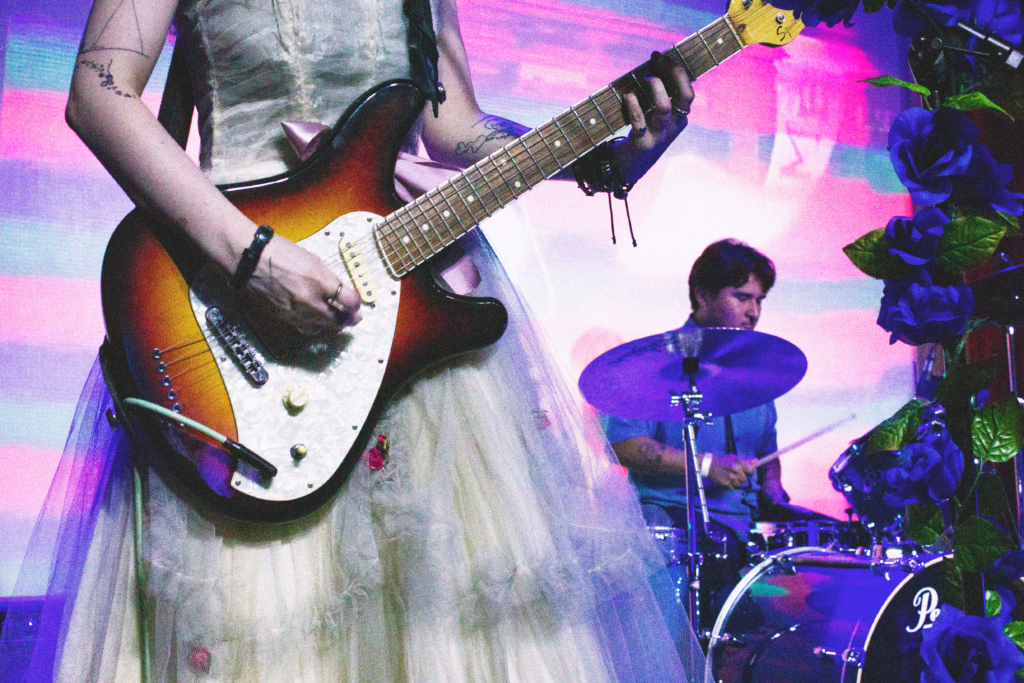
And lately there’s been a lot of chances to. In the past few months Flowers has had a pretty dominant stretch of gigs—opening for Snail Mail at DC9’s 20th anniversary, opening for Feeble Little Horse at Songbyrd’s pilot matinee show, headlining a stacked locals gig with Blunda and TORO at Pie Shop, and a single release celebration for “Two of Me” back at the Byrd. Not to mention the Handwoven split EP from both vocalist’s side projects (Honey Stomach and Mannequin Fight) with a sold out release show at Rhizome, a Flowers West Coast early summer tour, and two upcoming gigs: one for the D.C. Punk Archive on the MLK Library rooftop this Wednesday and a release show for “Teeth,” the second single from their formally unannounced sophomore record, on the 31st. They are the portrait of a DIY artist in bloom.
I had a chance to talk with Jessie Szegö (lead guitar and vocals) and Ricky “Ten Bears” Martinez (drums) about their writing process for the new project, upcoming shifts in their sound, and the somewhat shaky state of local music. As expected, they were pretty quiet and very, very cool. No matter how “all over the place” the D.C. scene is, anyone here with an ear to the ground is gonna feel FFTD’s second album. Brace for impact.
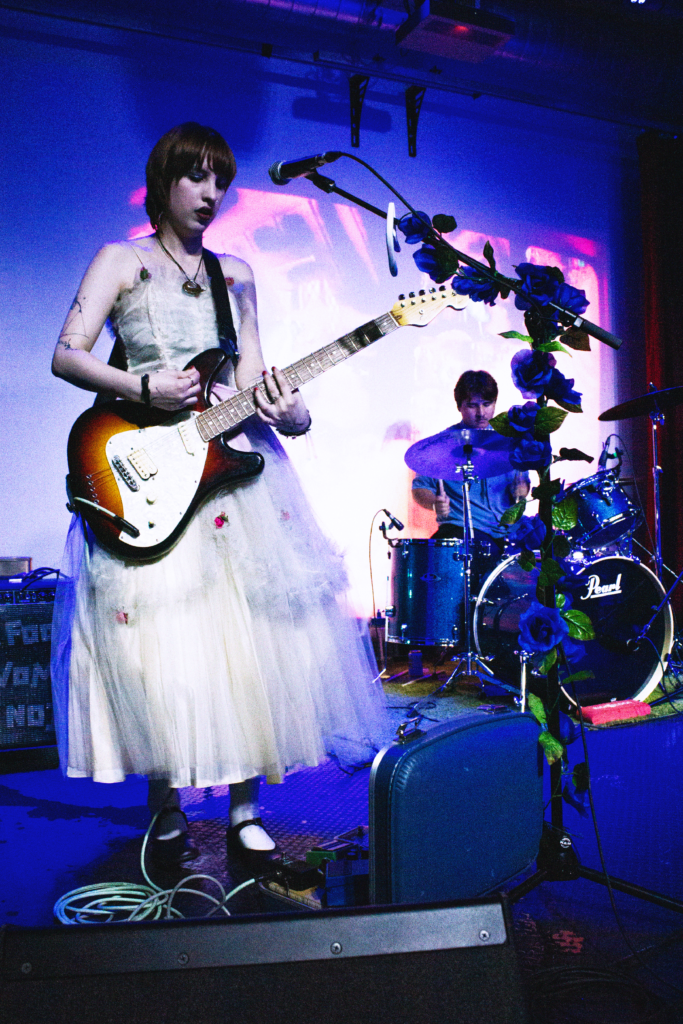
This interview was originally recorded and aired on Taking Notes on WRGW on April 4, 2024 and has been edited for length and clarity.
How we doing today?
Jessie Szegö: We’re doing pretty good. It’s a wonderful Thursday. You know, feeling good?
Ricky Martinez : Yeah, I’m chilling, chilling.
What was it like opening for Snail Mail?
J: It was pretty crazy, honestly, because Snail Mail has been one of my favorite artists since I was like, 14 years old. So it was pretty much like a full circle moment to be meeting her and playing a show with her. It was just mind boggling. It was crazy. And so weird, seeing her in such a small, small little club.
Birthday Girl also opened that show. I was talking to them at Pie Shop, they’re lovely.
J: So sweet.
R: Yeah they’re cool.
I was just so blown away at how many good local bands were on that bill.
J: Yeah, it was a pretty crazy bill. Our friends from Public Circuit, we met them when we were on tour in New York, and they basically set up the show. And I didn’t even tell them who to hit up. They just like, hit up all of the best D.C. bands. And I was like, wow, this is, like, an awesome bill.
TORO is a great band. I met TORO at AU playing with Mannequin Fight with Ella [Buskirk].
J: Oh yeah, yeah, Mannequin Fight is so sick. They are awesome… our missing member!
When did Ella join the band?
J: Ella joined last summer. We didn’t really start playing until like September, like fall time, but she’s been in the band since last summer.
How did Ella joining the band change the sound?
J: So much
R: Everything. She felt like the missing piece of the band for sure. She’s brought a whole different wave of energy to the band that fits just right, you know? And we’ve been able to bounce ideas a lot easier now with her.
J: She adds obvious things, like harmonies, and when we recently recorded our album, she played cello on it. She’s an amazing cellist, so that’s a cool new thing we’re kind of diving into. But also it’s just cool to have another brain in the project, because I feel like our brains work really well together. Before I would write the songs, and I kind of had no other input from anybody else. It was kind of just me shooting off ideas and the band would be like, ‘yep, sounds good, what do you want me to play?’ They would listen to me and kind of play whatever I wanted but almost in a passive way where no other ideas were kind of flowing. I didn’t really have anybody to challenge or push my creative bounds at all. It’s just a different feeling when we’re writing now because she’s got so many great ideas.
R: They just sink and lock in in a different way. I mean for me, I’m just like, ‘oh, the song sounds perfect,’ and then Ella would throw in a random idea. Even in the studio she was just tossing out ideas. I was like, ‘I don’t know if that’s gonna work.’ Then I would hear it and I’m like, ‘how did you even think of that?’ She does a really good job of throwing out stuff and it works every time.
J: All of the cello parts were written in the studio. We didn’t have any pre-planned parts but then Ella would hop on the cello and shred. Also a lot of harmonies we added in the studio weren’t planned. I would have an idea of what I wanted the harmony to be in my head and then she would just go and record something completely different I never would have thought of, and it adds a whole different tonality to the song.

You all seem so close on stage. Ella does a lot of the crowd work, yeah?
J: She does, yeah. I’m a little shy, so I kind of let her handle that.
I read in different interviews with you that a lot of people will use the label grunge for your sound, but you’re not a huge fan.
J: I have mixed feelings about it. When I first started Flowers, grunge was definitely in the forefront of my mind. That’s what I was listening to, and kind of the bands that I was emulating. I was like, “I want to be grunge. I want to be dark and gritty.” And I feel like our sound has grown so much that the label kind of doesn’t do it justice anymore. I think maybe at one point I’d be like, yeah, we’re grunge, but especially with the new stuff we’ve been writing and our new record that’s gonna come out, I feel like we’re so much more than that now. It’s such a lazy label. I mean, I love grunge music. But I definitely feel like we have a lot more different influences now.
Like?
J: I feel like we’re mixing a lot more indie rock elements and shoegaze for sure.
R: It’s bits and pieces of everything that we equally like.
J: [“Two of Me”] has got a different energy than the stuff we have out. It’s gonna be a little bit of a shock to people, but I feel like people will like it. It’s a very energetic song, and it’s one of our favorites off the album.
R: It’s a good taste of how we’re shifting things a little bit. But it’s not too strong of a shift, it’s just enough. It sounds more happy-go-lucky, fun, you know, like we’re having a good time.
J: No more dark grunge. It’s still got the distorted guitars and the heaviness, but it’s definitely a little more catchy. It makes you want to bop your head a little bit.
R: I think there are a few songs we have like that, more of a poppy, good time.
What inspired the shift?
J: I think it was more of a natural progression. I think I had just gotten tired of the stuff we were writing before. With every song I write, it’s always gonna be different than the last one that I wrote. It was kind of a natural next step for us. It wasn’t too intentional. And I think what came out is probably our best batch of songs yet.
R: Yeah It was definitely natural, because we don’t even really plan it out that much. We just kind of just bring it to each other, and then it makes its own thing. The songs just ended up becoming poppy –
J: They’re not, like, poppy.
R: Not poppy, but you know what I mean? I can definitely headbang to this, they get stuck in my head.
Do you have a release date?
J: Um, no, we’re working on, like, fall time, so September, October, hopefully if everything gets sorted out.
What was the rollout like for your previous record?
J: I just dropped one single and then a month later, like, here’s the album.
Woah.
J: Yeah I didn’t really have a marketing strategy, or any specific, promotional things. So we’re still trying to figure that all out.
The groundswell of support for that music is great, it gets a lot of listeners.
J: Yeah, yeah we didn’t really do much to promote it I guess.
Where do you think that came from? Was it just word of mouth?
J: Yeah, I think it was just the amount of shows we played, because we dropped the album and then just played shows. And we haven’t dropped music in like two years. We’re kind of riding off the high of that album. So hopefully, you know, once we drop new music, we’ll kind of get the ball rolling again.
You have this great connection with Red Brick booking. How’d that come about?
J: I don’t really know! Our first Red Brick show that we ever played was last year, the Joy Again one. I don’t know how… the drummer from Snail Mail, Ray Brown, he runs Red Brick, and I don’t know how he found us, he just, like, stumbled upon us. That’s, I guess, a question for him, like, how he discovered us. But he just emailed us and was like, “do you want to play with Joy Again?” And we were like, uhh yeahhh. And then we met him, and he really liked us, we really liked him, and we kind of have been talking back and forth. He always gets us our coolest shows. Every time I get an email from him, I know it’s gonna be good.
Was that how you got the Snail Mail connect? He reached out?
J: I think so, yeah! I think he recommended us for that show too. We’ve played like, five or six Red Brick affiliated shows at this point. And our single release show is a Red Brick show too. All of his shows that he books are always so cool. So I can always count on people to be there and it to be really exciting.
The Feeble [Little Horse] show was especially cool. The matinee is so cool, I hope they do that again.
J: I think they will, because they made a post and were like, “you guys all loved the matinee show!” It was a cool vibe, they had the garage doors open, it was kind of nice outside, and it was all bright. Playing a little afternoon show, it’s fun.
Can we talk about gear? What’s on your board?
J: Right now, I’ve had the same, like eight pedals for years. My main distortion is a Big Muff obviously. I just upgraded. I used to have the Big Muff Nano, but I got a bigger Muff. I don’t even know what it’s called. And then I have a blues driver and a tube screamer. Then I got a phase 90 and an EQ pedal, and that’s kind of been my essentials for the past three years.
Ella just runs the one pedal, right?
J: Yeah, just the one bass Big Muff.
Were you doing any different sounds pedal wise or equipment wise on this record?
J: We did a lot of different sounds on the record. We recorded it at Sonelab studios in Massachusetts, so we did a little Massachusetts trip for a week. The producer that we worked with on this new album, Justin Pizzoferrato, was just amazing. He had literally hundreds of pedals and he’s just a genius. Every time we’d be recording guitar for a song, he’d be like, “Wait one second” and he’d go to his closet and come back with like, five pedals and be like, “I have the perfect sound for you.” And we’d be just messing around. He brought in five different Big Muffs, and I got to test out all these really old, expensive, giant pedals. We got to play around with the tone a lot, because he was just very knowledgeable and knew exactly what the record needed.
What were you listening to while you were writing this new album? And what was the writing process like?
J: I’m always listening to the Breeders. I feel like people definitely hear that influence. We’re just ripping off Kim Deal the whole time. PJ Harvey is a huge inspiration for some of the tracks on the new album.
R: Same thing as always for me. Again, like the Breeders. When it comes to Flowers, definitely the Breeders, the Doors. I like a lot of John Densmore stuff. Just any type of hardcore drumming.
That’s what you’re listening to for Flowers – Ricky, you’re in another band, yeah?
R: Yeah, I’m in a couple, haha.
Tell us about ‘em.
R: So I’m in Flowers. I’m in my other band Houser… well I guess these other two aren’t really active anymore, but if they pop up, Imma definitely be there playing drums; Coma Kills, Curb Alert.
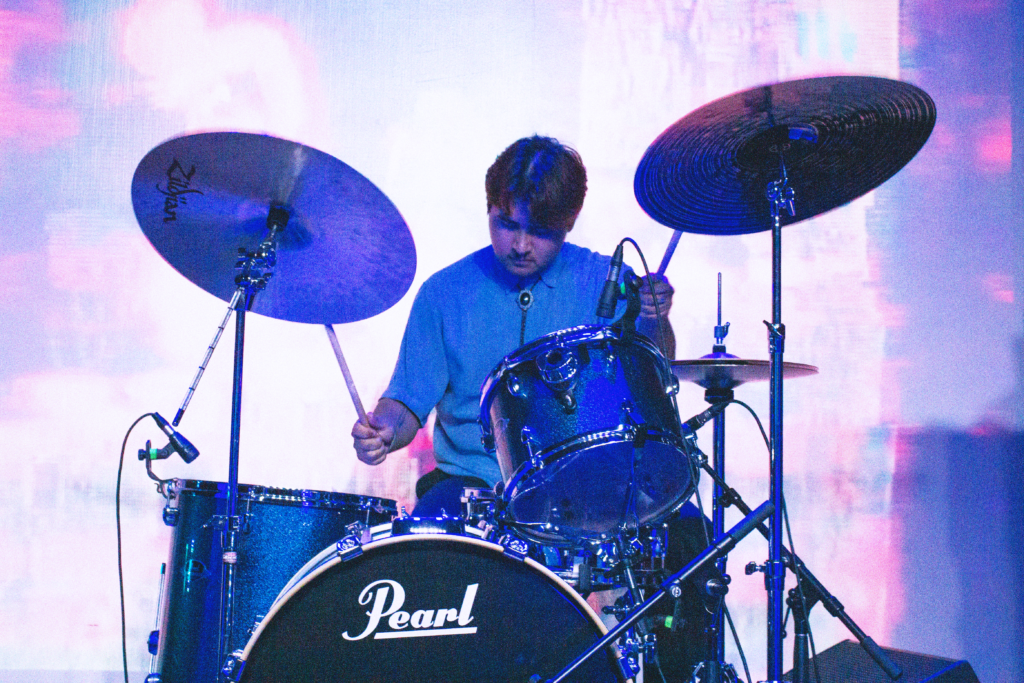
I feel like that’s such a common thing in scenes. There’s so few drummers, and they’re always in multiple bands.
J: Classic.
R: Yeah, I’ve become a scene drummer. I’m getting pulled by everyone haha.
J: It’s fun when you have a little community of musicians, and you’re starting a new project, and you’re like, “I have the perfect person for this,” and just pick out somebody from one of the various bands you know.
How would you describe the music scene in D.C.?
J: I don’t know, I have mixed feelings about the D.C. scene. On one hand, I feel like it’s kind of all over the place. There’s a lot of different bands doing a lot of different genres and I feel like there’s a weird sense of genre superiority. Each band is doing their own thing, and they’re like, this is the cool thing to do. And there’s not really a huge sense of community within genres, like there is in other places where there’s a huge hardcore scene in this city, and there’s a huge shoegaze scene in this city. I feel like D.C. is kind of all over the place. But also that can make it kind of cool that, you know, there’s not just one sound.
Have you experienced that feeling of genre superiority? Where you’re sharing a bill with a different band and they give you the cold shoulder?
J: A little bit. I don’t know it’s always weird. I feel like we’re finally starting to share bills with bands who we align with, and would like to be associated with. But I remember playing a show, and just feeling super out of place because there’s a blues rock band and a psych jam band and then like a rock and roll band, and it’s just weird. You don’t really feel a sense of community. Maybe that’s just me, but I’ve always felt out of place I guess. There’s definitely a lot more good bands popping up and it’s cool to play with them and feel something like a community, especially of younger people. Because a lot of times there’s an age gap where there’s a lot of older people playing music. We gotta get the young people out there.
So there’s this fracturing because of differences in genre, which is really interesting because of D.C.’s roots in the punk scene, but I also feel like there’s a fracturing from distance? That there’s not as much–
J: That too, yeah, yeah. There’s not a lot of venues. There’s like five mid-sized venues for small bands. It’s like, Pie Shop, Runaway, Slash Run, Songbyrd and that’s like, that’s it. We don’t have any DIY spaces, or they all get shut down. And D.C. is very spread out. It’s not a very walkable city so I feel like it’s hard to get people out of their houses and go to shows. Every time we go to play New York or Philly, it’s always so many people packed into a tiny venue on like a Monday night. Because there’s just always people looking for something to do. I don’t know, D.C. is a weird city where I feel like people don’t show up to shows.
How do you think we get back to – or do you think we can get back to – having a united scene of younger bands?
J: Um, it’s definitely possible. I mean, I don’t claim to have all the answers, D.C. is cool for its own reasons. I think we just need more people in it. We need more people playing in bands. We need everybody to pick up an instrument and just start a band. Because I feel like that’ll create an even bigger sense of community if all of your friends start bands and you’re all just playing together.
R: Not even just the bands, but like… you have a homie who’s really good at doing flyers and you have a homie who does your stickers and your t-shirts. Those things also help really wrap it up as a whole community, because–
J: Right, not everybody has to do music. People making art and just like doing things like, putting together shows, or making zines, just like doing anything that has to do with community.
R: I think that’s definitely a huge part of what keeps it together. Because you can have like, a million bands, but it’s the people who show up to the shows to sell stuff and help you out, to book the show and to put the flyer up. You need those people too.

